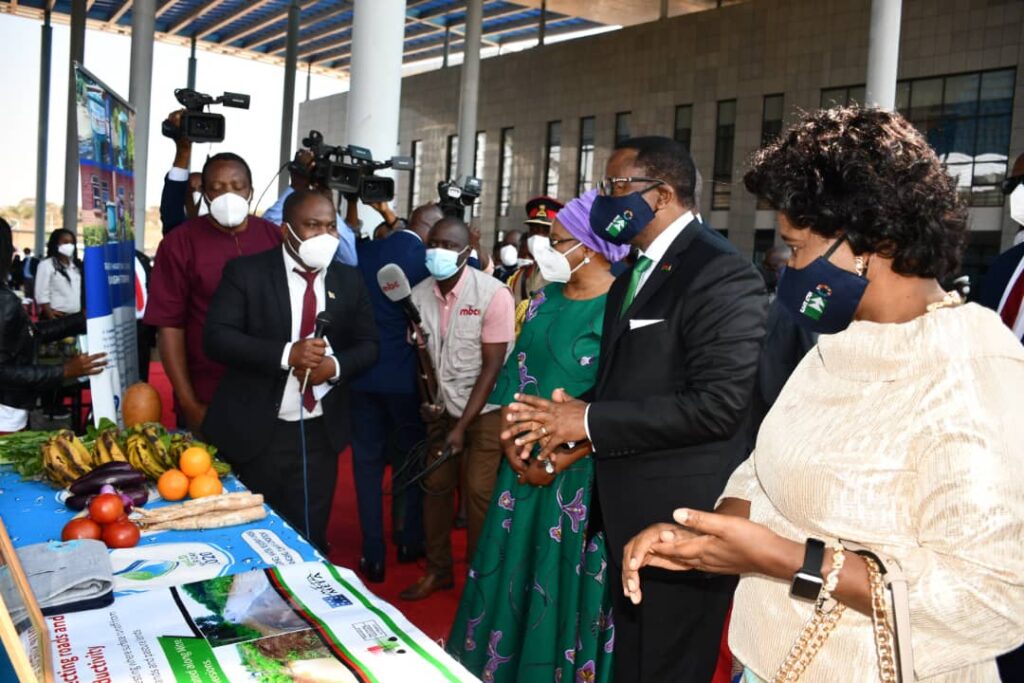By Nellie Kapatuka

Mana, August 26, Lilongwe: President Dr. Lazarus Chakwera, has called upon stakeholders and people in the country to step up efforts in the fight against climate change in order to make Malawi an environmental sustainable society and economy.
Speaking during the opening ceremony for the two-day National Green Climate Conference, happening for the first time in the country, Chakwera spoke of the need for concrete strategies and actions to stir Malawi into becoming climate resilient.
“I envision the creation of a green Malawi and I call upon all stakeholders in the public and private sector to partner with my administration in stepping up efforts to make and keep the warm heart of Africa the greenest economy and society on the continent.
“A green Malawi is not just possible, a green Malawi is what we are building, my whole heart is in it, my whole philosophy government is in it,” he said.
According to Chakwera, Malawi is going through a climate change crisis, which he said presents the single biggest threat to the nation’s sustainable development.
“Climate change impacts are disproportionately burdening the poorest and the most vulnerable of our people and damaging our already fragile economy and ecosystems,” he said.
Furthermore, the president said Malawi is considered a climate change hotspot country which he described as an acute vulnerability that comes from a history of a rapidly growing population, water scarcity and falling food production, often associated by climate related floods and drought of increasing scale, intensity and devastation.
Apart from putting restrictions to efforts to adapt and build resilience against the impacts of climate change, Chakwera said Covid-19 has disrupted businesses, a situation that has also contributed to the increased plunder of the country’s forest reserves, as people desperately scramble for ways to earn a living.
Said Chakwera: “Our path to recovery from these threats is likely to be long and costly but what we stand to gain in the end is far greater than what will cost us to get there.”
“As a country, our recovery and reconstruction from the adverse effects of climate change requires an excess of K300 billion.”
The president, said his government guiding principle on climate change is “Collective Responsibility Now” and has since called for collective climate action using relevant, collaborative and urgent actions in responding to the country’s climate change crisis.
In her remarks, Minister of Forestry and Natural Resources, Nancy Tembo shared highlights of a report by the Intergovernmental Panel on Climate Change (IPCC), which predicts rising global temperatures.
“Temperatures will rise to about 1.5 degrees Celsius within the next decade and this spells trouble for countries like Malawi if we do not act quickly,” said Tembo.
According to the Minister, the rise in global temperatures will inevitably affect people’s livelihood due to the extreme changes in the weather.
She has since challenged people in the country to check themselves if their actions are enough to make Malawi better further adding that efficient and inclusive ecosystem restoration is what is needed to shift towards a healthier greener future.
Presenting his keynote address, Director General for the National Planning Commission, Dr. Thomas Munthali, said if climate change management is not carefully coordinated, it is unlikely that the country will achieve some of its plans of becoming a middle income economy and also achieving most of the Sustainable Development Goals by 2030.
UN Resident Coordinator, Maria Jose Torres and acting British High Commissioner to Malawi Fiona Ritchie, spoke of their commitment to ensuring that Malawi is given enough support to mobilize resources for accelerating action in the fight against climate change.
During the ceremony, Chakwera launched the Malawi Women’s Network in Climate Action, with a call for more inclusion and enhanced participation by all sectors in the fight against climate change.
The two-day National Green Climate Conference is being held under the theme “Collective Responsibility for Enhanced Climate Action in Malawi.”


